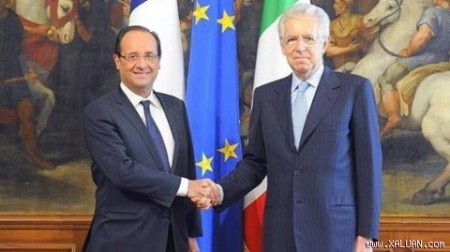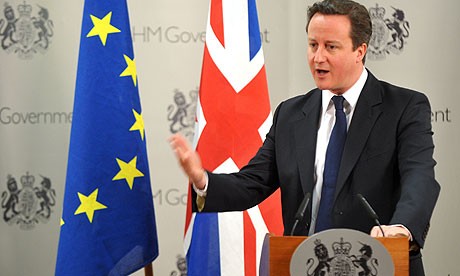EU summit on budget challenges
Hong Van -
(VOVworld) – 2013 EU summit is scheduled to take place in Brussels later this week focusing on the bloc’s budget for the 2014 to 2020 period, a source of sharp disagreement between EU members in previous meetings. Leaders appear pessimistic about reaching any consensus on a budget worth 1 trillion Euros. VOV’s Hong Van reports:
 |
French President Francois Hollande and Italian Prime Minister Mario Monti
|
French President Francois Hollande and Italian Prime Minister Mario Monti have both said it is getting more difficult to reach any agreement on the EU budget for the seven years beginning in 2014. The two leaders shared that view in a joint communiqué released last Sunday. President Hollande warned that although France wants to reach a joint agreement, he doubts such a document will be realized in the near future. German Prime Minister Angela Merkel also admitted that she is prepared for tough talks. Meanwhile the European Parliament’s President Martin Schulz told a German newspaper that this budget aims to correct social inequality caused by the economic crisis.
 |
| British Prime Minister David Cameron (Photo: telegraph.co.uk) |
In a long-term budget estimate announced by EC President Herman Van Rompuy last November, the bloc’s 2014 to 2020 budget will shrink about 80 billion Euros. This is less than the 100 to 120 billion Euro cut proposed by the EU’s main contributors, the UK and Germany. The budget has triggered heated disagreement among EU members who don’t want to shoulder the financial burden during the current austerity period. The UK has asked for the biggest cuts and doesn’t agree with the amount it has received from the EU’s annual reallocation saying it’s too little compared to its contribution.
Italian Prime Minister Mario Monti said the contribution should match the economic growth of each nation. Agreeing an EU budget will be difficult. Several members have said they will vote against any plan that cuts too much.
In case, the EU will not adopt the budget, social inequality in this bloc will turn out corollaries for laborers in each nation. On top of economic recession, unemployment rate will get a high record; different financial source of revenue will create a gap among members. It’s not to mention the Europe will not have enough funding to prevent future influence caused by other crises in the bloc.
Last November the EU failed in its first effort to adopt a 1 trillion Euro budget. This time reaching a EU budget agreement seems infeasible.
Hong Van